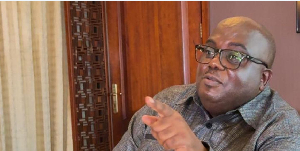Molecular and Cellular Toxicologist, Professor Augustine Arukwe, has advocated the effective management of plastics rather than banning them outrightly.
Some environmentalists believe Ghana must go the Rwandan way by banning all plastics if the government is serious about making Accra the cleanest in Africa, but the Norway-based professor disagrees.
Speaking to Class News' Joshua Kodjo Mensah on the sidelines of a seminar on plastics organised by Inno-Sci, Professor Arukwe said effectively managing plastics is a sure way of reducing the plastic waste menace, but a total ban would be “radical and unreasonable.”
He said: “Plastic waste is a problem but it’s a manageable problem. Plastic products will never go away but we can manage it for sustainable development. Although the environmental contaminants that leach out of plastics are of significant health consequences to both wildlife and humans, it’s a problem that has come to stay, but we can manage it for sustainable development.
“Banning plastic is not the way to go, it is sad that some African leaders have half-baked ideas on solving global problems. It is very radical to ban plastic because what it does is to create unnecessary hardship and also reduce national scope for growth.
“A better solution could have been to manage plastics. A ban is important, banning the use of single-use plastics like straws and plastic plates might be a better solution…but banning plastics totally is unreasonable, it’s too radical and its naïve to think you can get rid of plastic like that.
“I’ll advocate better management and processes that will reduce the use of plastics, and, of course, I’ll support the ban of single-use plastics.”
Proffering solutions to how plastics can be managed, Professor Arukwe who is also the Deputy Head of Department, Research and Innovation at the Norwegian University of Science and Technology said: “We should take personal responsibility of the plastics we use and recycle plastics but this will need a political will. Let’s create collection centres for plastics and educate societies not to dispose of plastic products discriminatorily in the environment.
Regional News of Saturday, 18 August 2018
Source: classfmonline.com
Banning plastics 'naive, unreasonable, radical' – Professor
Opinions












